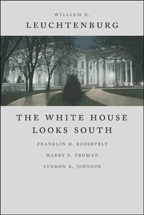
688 pages / 6.12 x 9.25 inches / no illustrations
Perhaps not southerners in the usual sense, Franklin D. Roosevelt, Harry S. Truman, and Lyndon B. Johnson each demonstrated a political style and philosophy that helped them influence the South and unite the country in ways that few other presidents have. Combining vivid biography and political insight, William E. Leuchtenburg offers an engaging account of relations between these three presidents and the South while also tracing how the region came to embrace a national perspective without losing its distinctive sense of place.
According to Leuchtenburg, each man "had one foot below the Mason-Dixon Line, one foot above." Roosevelt, a New Yorker, spent much of the last twenty-five years of his life in Warm Springs, Georgia, where he built a "Little White House." Truman, a Missourian, grew up in a pro-Confederate town but one that also looked West because of its history as the entrepôt for the Oregon Trail. Johnson, who hailed from the former Confederate state of Texas, was a westerner as much as a southerner.
Their intimate associations with the South gave these three presidents an empathy toward and acceptance in the region. In urging southerners to jettison outworn folkways, Roosevelt could speak as a neighbor and adopted son, Truman as a borderstater who had been taught to revere the Lost Cause, and Johnson as a native who had been scorned by Yankees. Leuchtenburg explores in fascinating detail how their unique attachment to "place" helped them to adopt shifting identities, which proved useful in healing rifts between North and South, in altering behavior in regard to race, and in fostering southern economic growth.
The White House Looks South is the monumental work of a master historian. At a time when race, class, and gender dominate historical writing, Leuchtenburg argues that place is no less significant. In a period when America is said to be homogenized, he shows that sectional distinctions persist. And in an era when political history is devalued, he demonstrates that government can profoundly affect people's lives and that presidents can be change-makers.
“What Leuchtenburg offers to readers is a superbly researched and balanced account that helps us understand one of the most important political transformations in the last half of twentieth century America.”—Journal of American History
“With his trademark exhaustive archival and secondary research, shred analysis, and felicitous prose studded with apt quotations, he crafted . . . a fully realized study of the importance of place in politics as well as the significant role of the state and individual presidents as agents of change, all bedrock Leuchtenberg convictions at odds with much current historiography but persuasively put forth here.”—American Historical Review
“Leuchtenburg has been producing scholarship of extraordinary quality for more than a half century. . . . Leuchtenburg’s book chronicles the section’s development, the enormous accomplishments of three presidential giants who brought it about, and the mixed effects throughout the country of the reaction to their legacy. All students of America should savor his penetrating study.”—Journal of American Culture
“As the South continues to play out its regional destiny that remains linked to a unique history within the American experience, Leuchtenburg provides an insightful examination and clarification of the linked roles of three presidents deeply connected to the region in its more recent period of historic transformation.”—Journal of Southern History
“Writing in a fluent, accessible style, Leuchtenberg draws on period sources to recreate the attitudes and political struggles of these presidencies. His is a judicious assessment of their achievements and failings.”—Library Journal
Found an Error? Tell us about it.